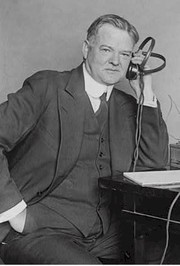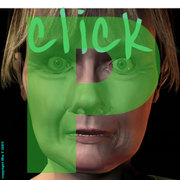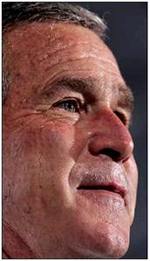It can take anywhere from one to three elections to set a new Political Thesis, a new set of political myths and values, and a new set of coalitions to support them.
The speed record for setting a new Thesis is one election. Even before Franklin D. Roosevelt was inaugurated, in March 1933, the New Deal coalition was established, as was the Democratic Party’s dominance of American politics, which would last a generation. (To the left, Herbert Hoover, destroyer of the Theodore Roosevelt coalition and father of the Nixon coalition — perhaps the most important Republican of the last century.)
The longest period for setting a new Thesis was three elections. The 1896 and 1900 elections set the dimensions of the Republican-Democratic split, but it was the 1904 re-election of Theodore Roosevelt which made progressivism the national political religion.
We can argue about how long it took for the Lincoln coalition of 1860 to become established political reality, although the War itself is my best estimate for it. The Nixon coalition of 1968, meanwhile, also took two elections to settle, as the 1972 victory over George McGovern set it in both dimension and ideology.
The only real question for 2008 is, how long will the new Political Thesis take to set, to become established, to become "real?"
Even if the Democrats choose Nixon, it seems the Republican Party is
dedicated to making this happen quickly. It may be George W. Bush’s
greatest achievement — the utter destruction of the party of Lincoln,
of Teddy Roosevelt, of Nixon and Reagan. As Republican support
declines throughout the country, and more-and-more people disassociate
themselves from Bush-ism, the remaining members only become more
adamant. None of the current Republican candidates has made a move to
repudiate Bush-ism, which is a necessary first step for them to become
competitive.
This makes it possible for Democrats to establish a new grand
coalition. Instead of settling for the narrow victories of a Clinton or
a Carter, they have the chance to re-establish what was lost by the
failure of LBJ. We’re talking a 60-40 split of the popular vote, and
majorities in both Houses of Congress that can overcome any filibuster.
The problem is that too many Washington Democrats believe the
key to creating such a coalition is to move toward the Republicans,
toward the "center." That means endorsing violence, albeit on a more
limited basis, and making only incremental changes in our policies
regarding health care and the environment.
This is a mistake of historical dimensions. Franklin Roosevelt didn’t move toward Hoover, and that is the right model for our time.
Yet it is precisely what Richard Nixon proposed in 1968. Nixon had
spent his entire career leaning against the New Deal Thesis, first on
behalf of McCarthyism and then in behalf of Eisenhower. He could not
conceive of a world where movement conservatism was triumphant, just as
Hillary Clinton today can not conceive of a world where the Netroots
define the political center, where the Internet is the dominant
medium, and where the War Against Oil, rather than a war for oil,
defines policy.
What frightens me is that Hillary may be unwilling, and unable, to
divorce herself politically from her husband. Barack Obama is anxious
to do precisely this, and John Edwards is anxious to do more, to
explicitly reject Bushism and all its works.
The choice will be made, by Democrats, over the next three months.
If Hillary’s lead remains as it is, history is her choice to make. How
long it takes her to move decisively is anyone’s guess.
But she will
have the room to run, the people will give it to her, and for that we
all have George W. Bush to thank. It is his greatest achievement.













“None of the current Republican candidates has made a move to repudiate Bush-ism . . . ”
Ron Paul? Let’s have a couple of primaries before we dismiss any candidate as irrelevant. Bill Clinton was not a front-runner in 1991. For that matter, wasn’t HW Bush polling better in 1991 than Hillary is now? I’m curious how the outcomes of elections would change if we didn’t have the national media feeding us polling data multiple times per day . . .
“None of the current Republican candidates has made a move to repudiate Bush-ism . . . ”
Ron Paul? Let’s have a couple of primaries before we dismiss any candidate as irrelevant. Bill Clinton was not a front-runner in 1991. For that matter, wasn’t HW Bush polling better in 1991 than Hillary is now? I’m curious how the outcomes of elections would change if we didn’t have the national media feeding us polling data multiple times per day . . .